

Computers in Human Behavior - The lies we tell and what they say about us: Using behavioural characteristics to explain Facebook activity. Volume 27, Issue 5, September 2011, Pages 1621–1626 2009 Fifth International Conference on Intelligent Computing — ICIC 2009 2009 Fifth International Conference on Intelligent Computing Edited By De-Shuang Huang Abstract Are there two definable groups of users of social networking sites based on the individual’s interaction style, that is whether the prime goal is to self-promote (broadcast) or maintain relationships (communicate)?
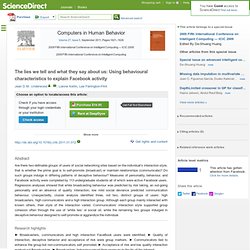
Research highlights ► Broadcasters, communicators and high interaction FaceBook users were identified. ► Quality of interaction, deceptive behavior and acceptance of risk were group markers. ► Communicators lied to enhance the group but non-communicators self promoted. ► Acceptance of risk and low quality interaction marked out Broadcasters. ► Broadcasters’ behaviour raised their exposure to the ills of the Internet.
Keywords. Computers in Human Behavior - Less effortful thinking leads to more social networking? The associations between the use of social network sites and personality traits. Volume 27, Issue 3, May 2011, Pages 1265–1271 Group Awareness in CSCL Environments Edited By Daniel Bodemer and Jessica Dehler Abstract Social network sites (SNS) have become an important social milieu that enables interpersonal communication by allowing users to share and create information.
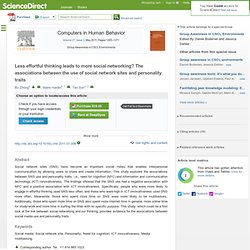
This study explored the associations between SNS use and personality traits, i.e., need for cognition (NFC) and information and communication technology (ICT) innovativeness. Keywords. Computers in Human Behavior - All about me: Disclosure in online social networking profiles: The case of FACEBOOK. Abstract The present research examined disclosure in online social networking profiles (i.e., FACEBOOK™).
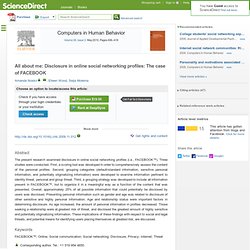
Three studies were conducted. First, a scoring tool was developed in order to comprehensively assess the content of the personal profiles. Second, grouping categories (default/standard information, sensitive personal information, and potentially stigmatizing information) were developed to examine information pertinent to identity threat, personal and group threat. Third, a grouping strategy was developed to include all information present in FACEBOOK™, but to organize it in a meaningful way as a function of the content that was presented. Keywords. Computers in Human Behavior - Social anxiety and technology: Face-to-face communication versus technological communication among teens. Abstract This study examined teens’ use of socially interactive technologies (SITs), such as online social sites, cell phones/text messaging, and instant messaging (IM), and the role that social anxiety plays on how teens communicate with others (technologically or face-to-face).
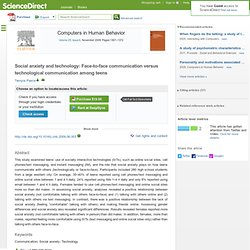
Participants included 280 high school students from a large western city. Computers in Human Behavior - Internet social network communities: Risk taking, trust, and privacy concerns. Abstract Individuals communicate and form relationships through Internet social networking websites such as Facebook and MySpace.
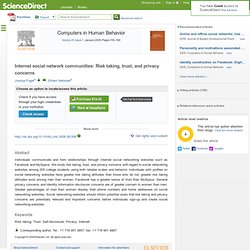
We study risk taking, trust, and privacy concerns with regard to social networking websites among 205 college students using both reliable scales and behavior. Individuals with profiles on social networking websites have greater risk taking attitudes than those who do not; greater risk taking attitudes exist among men than women. Facebook has a greater sense of trust than MySpace. General privacy concerns and identity information disclosure concerns are of greater concern to women than men.
Keywords Risk taking; Trust; Self-disclosure; Privacy; Internet Copyright © 2008 Elsevier Ltd. Computers in Human Behavior - Online social networks: Why do students use facebook? Computers in Human Behavior - Why people use social networking sites: An empirical study integrating network externalities and motivation theory. Computers in Human Behavior - Personality and motivations associated with Facebook use. Volume 25, Issue 2, March 2009, Pages 578–586 Including the Special Issue: State of the Art Research into Cognitive Load Theory Edited By Paul Ayres and Tamara van Gog Abstract Facebook is quickly becoming one of the most popular tools for social communication.
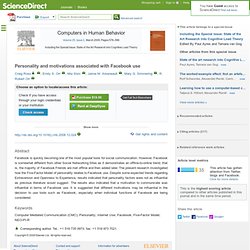
Computers in Human Behavior - Social network use and personality. Computers in Human Behavior - Who uses Facebook? An investigation into the relationship between the Big Five, shyness, narcissism, loneliness, and Facebook usage. Volume 27, Issue 5, September 2011, Pages 1658–1664 2009 Fifth International Conference on Intelligent Computing — ICIC 2009 2009 Fifth International Conference on Intelligent Computing Edited By De-Shuang Huang Abstract The unprecedented popularity of the social networking site Facebook raises a number of important questions regarding the impact it has on sociality.
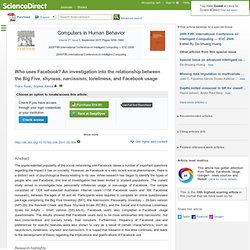
Research highlights ► We investigated how personality influences usage or non-usage of Facebook. ► Facebook users were more extraverted and narcissistic than nonusers. ► Facebook nonusers were more conscientious and socially lonely than users. ► Facebook usage habits varied as a result of certain personality traits. Unpacking the social media phenomenon: towards a research agenda - Kietzmann - 2012 - Journal of Public Affairs. Using Facebook out of habit - Behaviour & Information Technology - This article investigates the uses and gratifications of the popular social networking site Facebook.
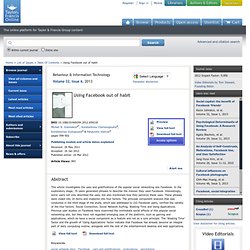
In the exploratory stage, 70 users generated phrases to describe the manner they used Facebook. Interestingly, some users not only described the uses, but also mentioned how they perceive these uses. These phrases were coded into 14 items and clustered into four factors. The principal component analysis that was conducted in the third stage of the study, which was addressed to 222 Facebook users, verified the validity of the four factors: Social Connection, Social Network Surfing, Wasting Time and Using Applications.
Social Media and the Activist Toolkit: User Agreements, Corporate Interests, and the Information Infrastructure of Modern Social Movements - Youmans - 2012 - Journal of Communication. The uprisings in Tunisia, Egypt, and elsewhere have been credited in part to the creative use of social media platforms such as Facebook and Twitter.
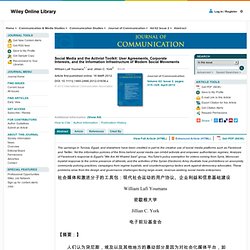
Yet the information policies of the firms behind social media can inhibit activists and empower authoritarian regimes. Analysis of Facebook's response to Egypt's “We Are All Khaled Said” group, YouTube's policy exemption for videos coming from Syria, Moroccan loyalist response to the online presence of atheists, and the activities of the Syrian Electronic Army illustrate how prohibitions on anonymity, community policing practices, campaigns from regime loyalists, and counterinsurgency tactics work against democracy advocates. These problems arise from the design and governance challenges facing large-scale, revenue-seeking social media enterprises. Les médias sociaux et le coffre à outils de l’activiste : les contrats d’utilisation, les intérêts commerciaux et l’infrastructure informationnelle des mouvements sociaux modernes.
Social Networking Site Use Predicts Changes in Young Adults’ Psychological Adjustment - Szwedo - 2012 - Journal of Research on Adolescence. Procedia - Social and Behavioral Sciences - Digital era psychology – studies on cognitive changes. Redirect Notice. Image management on Facebook : impression management, self esteem and the Cultivation Theory. Data & Knowledge Engineering - From humor recognition to irony detection: The figurative language of social media.
Abstract The research described in this paper is focused on analyzing two playful domains of language: humor and irony, in order to identify key values components for their automatic processing.
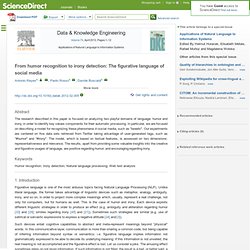
In particular, we are focused on describing a model for recognizing these phenomena in social media, such as “tweets". Our experiments are centered on five data sets retrieved from Twitter taking advantage of user-generated tags, such as “#humor" and “#irony". The model, which is based on textual features, is assessed on two dimensions: representativeness and relevance. The results, apart from providing some valuable insights into the creative and figurative usages of language, are positive regarding humor, and encouraging regarding irony. Keywords Humor recognition; Irony detection; Natural language processing; Web text analysis 1. Figurative language is one of the most arduous topics facing Natural Language Processing (NLP). The paper is organized as follows. 2. 2.1. 2.2.